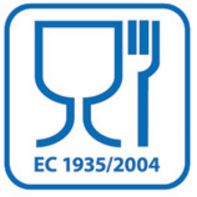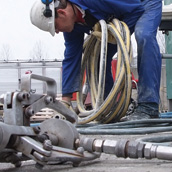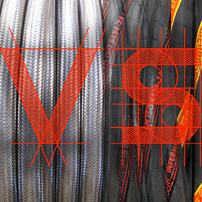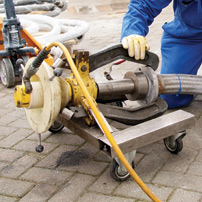
Which hose should you
choose for foodstuffs?
Where food is involved, food safety is top of the priority list. In order to work safely with food, it is necessary to use materials that do not contaminate the food. Are you sure your hoses are safe to come into contact with foodstuffs? If so, the hoses must comply with European Regulation EC 1935/2004. This regulation sets out the requirements for materials that come into contact with foodstuffs. We explain which materials are suitable for your application.
Avoid contamination
The material from which the hose is made may release harmful components into the food during use. This may lead to:
- Health hazards
- Unacceptable changes to the composition of the food
- Altered smell, taste, colour etc.
 To prevent this, hoses for use with foodstuffs must comply with Regulation (EC) 1935/2004. This is the European regulation governing materials and objects—including plastics, rubber, metals and silicone—intended for contact with foodstuffs. Migration testing is used to show whether a hose meets the requirements, and the results of these tests can be provided in a statement.
To prevent this, hoses for use with foodstuffs must comply with Regulation (EC) 1935/2004. This is the European regulation governing materials and objects—including plastics, rubber, metals and silicone—intended for contact with foodstuffs. Migration testing is used to show whether a hose meets the requirements, and the results of these tests can be provided in a statement.
Choose your material
In food applications, the hoses chosen are usually made of PVC, PTFE, polyurethane, NBR or EPDM. Not all materials are suitable for contact with all types of food. Below, you will find the EC 1935/2004 certified materials that are suitable for your application.
PVC hoses
PVC pipes are suitable for many applications where the operating pressure and temperature are limited, such as drinking water, soft drinks and various raw materials. The majority of PVC hoses have a temperature range of -20°C to +60°C. An advantage of PVC hoses is that they are transparent, light and generally very flexible. However, as its resistance is limited, PVC is not suitable for use with fatty foodstuffs.
Our advice
Opt for the Premium Multibar or the Polymetra Clear. These are the most popular choices from our range.
PTFE hoses
In applications where the demands are high due to temperature, pressure or movement, PTFE hoses are ideal. PTFE hoses are used as supply hoses for filters and centrifuges, for drying towers and for use with fragrances and flavourings. PTFE hoses have a temperature range of approximately -70°C to +260°C, boast excellent chemical resistance and are very easy to clean.
Our advice
Choose from our ranges of smooth hoses, corrugated hoses and exclusively externally corrugated hoses.
Polyurethane hoses
Hoses that are used with dry and abrasive foods are often manufactured from polyurethane. Polyurethane is resistant to fatty foods and has a temperature range of -40°C to +90°C. These hoses are also ideal for milk powders, spices and other dry ingredients.
Our advice
The Abraflex MD Food and the AbrATEX MD are the most popular choices.
NBR hoses
NBR rubber hoses are oil-proof and greaseproof and are widely used for milk, cream, vegetable oils and mayonnaise as well as for soft drinks, among other applications. The hoses are supplied both with and without a spiral. The temperature range is typically between -30°C and +100°C.
Our advice
The Nutralon, Nutralon SD Lite and the Nutralon SD are suitable for a versatile range of applications.
EPDM hoses
EPDM hoses are frequently used for drinks and juices and are suitable for -30°C to +90°C. The Premium Delifixx and Purpur hoses are often used for beer, soft drinks and wine. These types are also suitable for beverages with a high alcohol content. Cleaning hoses are often produced from EPDM, including the Premium Cleanfixx FDA with a temperature range of up to +164°C.
Stainless steel hoses
The use of corrugated stainless steel hoses is limited in the food industry; the corrugated inner wall is not ideal for cleaning. For applications with high temperatures (up to +600°C), where only stainless steel hoses are suitable, ERIKS offers the 161 Food hose. The flat rippling on the hose makes it easier to clean and means that no medium remains in the ripples. Our in-house welding shop can provide this hose with the fittings you require.
Need more advice? At ERIKS, we have experts in the area of food safety. They will be happy to help you make your choice. One of our Application Engineers can even advise you on-site of the best solutions. Don't hesitate to contact us.
READ MORE ABOUT HOSES






